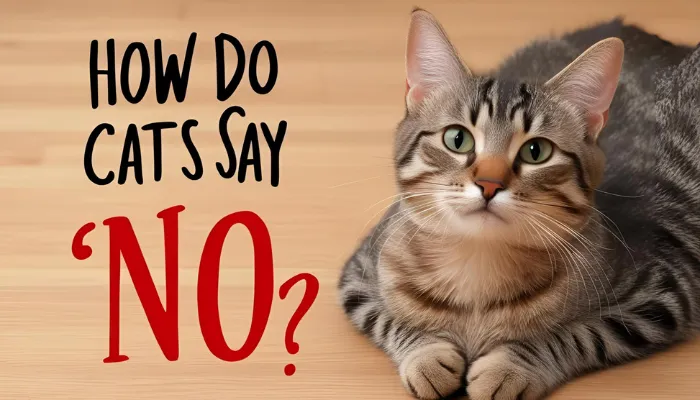How Do Cats Say “No”? If you are a cat owner, you would notice that our feline companions have their exclusive ways of rejecting things they dislike. Perhaps the most notable one is their tendency to blanket us with the silent treatment. Cats do not use words like humans do, but they do provide signs where one would immediately know, “I don’t want this.”
Their ways of refusal range cats with amusing first-rate animation variety. Certain cat owners utilize a Cat Translator app to translate verdured actions. Knowing these signs lets you connect better with your pet.

10 Clear Ways Cats Say “No”
Cats have unique ways of expressing their refusals. Below are 10 common signs they use:
1. Swatting or Pawing Away
- Cats use their paws to bat away things they dislike.
- This includes unwanted petting or a toy they don’t like.
2. Flattening Their Ears
- When a cat flattens its ears, it’s a clear “no” sign.
- This means they are uncomfortable or annoyed.
3. Hissing or Growling
- A cat will hiss or growl when it strongly refuses something.
- This is often a warning to back off.
4. Turning Their Back
- A cat walking away is a strong signal of rejection.
- If they turn their back to you, they are saying, “Not interested.”
5. Flicking Their Tail Rapidly
- A twitching tail indicates irritation.
- The faster the tail moves, the more annoyed they are.
6. Avoiding Eye Contact
- Direct eye contact can be a challenge in cat language.
- If your cat avoids looking at you, they are dismissing you.
7. Refusing to Eat
- An unhappy cat may opt to avoid their meal entirely.
- Refusing to eat is an instinctive way of saying “no” to a particular meal.
8. Biting Lightly
- Some cats give gentle nips to show their displeasure.
- This usually happens during unwanted petting.
9. Running Away
- A cat will dash off in the opposite direction if they do not like a scenario.
- They might be startled by some sounds or unfamiliar people.
10. Sitting with Their Back to You
- This is a passive way of saying “no” without confrontation.
- It means they don’t want to engage at the moment.
Cats have clear ways of saying “no,” from swatting to turning their backs. Understanding their signals helps strengthen your bond. How do cats say “NO”? Watch for these signs!
How Body Language Reveals a Cat’s “No”?
Cats rely heavily on body language to communicate. Here’s a breakdown of key signals:
| Body Language | Meaning |
|---|---|
| Ears pinned back | Annoyed or angry |
| Tail flicking rapidly | Frustration or irritation |
| Hissing | Strong refusal or warning |
| Back arched | Defensive and rejecting contact |
| Turning away | Disinterest or rejection |
Cats use subtle body language to say “no” loud and clear. Pay attention to their signals for a better bond!
How Cats Refuse Other Animals?
Cats can refuse even other animals, meaning they do not only say “no” to humans.
- Hissing at Another Feline – When a feline hisses, it is a warning to the other feline to keep their distance.
- Pawing Away a Dog – A cat may swipe at a dog to establish boundaries.
- Walking Away – Ignoring another pet is a passive way of saying “no” to interaction.
- Hiding – If a cat disappears under the bed, it does not want company.
Cats set boundaries with animals just like they do with humans. How do cats say “NO”? Watch for these clear signals!
Signs Your Cat Doesn’t Want to Be Held
Not all cats enjoy being held. Here are signs they don’t want to be picked up:
- Struggling and wriggling – A clear attempt to escape.
- Pushing against you – They want you to put them down.
- Meowing in distress – A vocal plea to stop.
- Jumping away as soon as released – Immediate rejection.
Cats make it clear when they don’t want to be picked up. Respecting their signals builds trust and comfort. Watch for these signs to keep your cat happy!
Why Your Cat Refuses to Eat?
If your cat refuses food, it may be expressing disinterest. Here are ways they say “no” to a meal:
- Sniffing and walking away – Not interested in the scent.
- Scratching the floor near the food bowl – Sign of rejection.
- Turning their head away – A definite “no” to that food.
Cats have clear ways of rejecting food when they’re not interested. How do cats say “NO”? Watch their body language for the answer!
How to Respect a Cat’s “No”?
Setting boundaries is crucial for a cat’s well-being. Here are ways to achieve this:
- They Are Trying To Tell You Discomfort – Understand their body movements.
- Give Them Space – Let them decide interactions.
- Avoid Forcing Contact – Cats dislike forced affection.
- Provide Options – Let them come to you on their own.
Respecting a cat’s “no” strengthens trust and improves your bond. Give them space and let them choose interactions!
Conclusion
How Do Cats Say “No”? In addition to hissing, they can use legs movements and many more. They can flick their tails or hiss and even just ignore or walk away from you. Make sure to watch how they communicate with you. Strengthening your relationship with your cat means understanding these signals. You can enhance your bond with cats through these insights.
